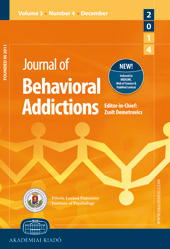Unpacking the Public Stigma of Problem Gambling: The Process of Stigma Creation and Predictors of Social Distancing
Unpacking the Public Stigma of Problem Gambling: The Process of Stigma Creation and Predictors of Social Distancing
Author(s): Nerilee Hing, Alex M.T. Russell, Sally GainsburySubject(s): Social psychology and group interaction, Behaviorism, Social differentiation, Crowd Psychology: Mass phenomena and political interactions, Substance abuse and addiction
Published by: Akadémiai Kiadó
Keywords: public stigma; problem gambling; gambling disorder; stereotyping; social distance; devaluation and discrimination;
Summary/Abstract: Public stigma diminishes the health of stigmatized populations, so it is critical to understand how and why stigma occurs to inform stigma reduction measures. This study aimed to examine stigmatizing attitudes held toward people experiencing problem gambling, to examine whether specific elements co-occur to create this public stigma, and to model explanatory variables of this public stigma. Methods: An online panel of adults from Victoria, Australia (N = 2,000) was surveyed. Measures were based on a vignette for problem gambling and included demographics, gambling behavior, perceived dimensions of problem gambling, stereotyping, social distancing, emotional reactions, and perceived devaluation and discrimination. A hierarchical linear regression was conducted. Results: People with gambling problems attracted substantial negative stereotypes, social distancing, emotional reactions, and status loss/discrimination. These elements were associated with desired social distance, as was perceived that problem gambling is caused by bad character, and is perilous, non-recoverable, and disruptive. Level of contact with problem gambling, gambling involvement, and some demographic variables was significantly associated with social distance, but they explained little additional variance. Discussion and conclusions: This study contributes to the understanding of how and why people experiencing gambling problems are stigmatized. Results suggest the need to increase public contact with such people, avoid perpetuation of stereotypes in media and public health communications, and reduce devaluing and discriminating attitudes and behaviors.
Journal: Journal of Behavioral Addictions
- Issue Year: 5/2016
- Issue No: 3
- Page Range: 448-456
- Page Count: 9
- Language: English

